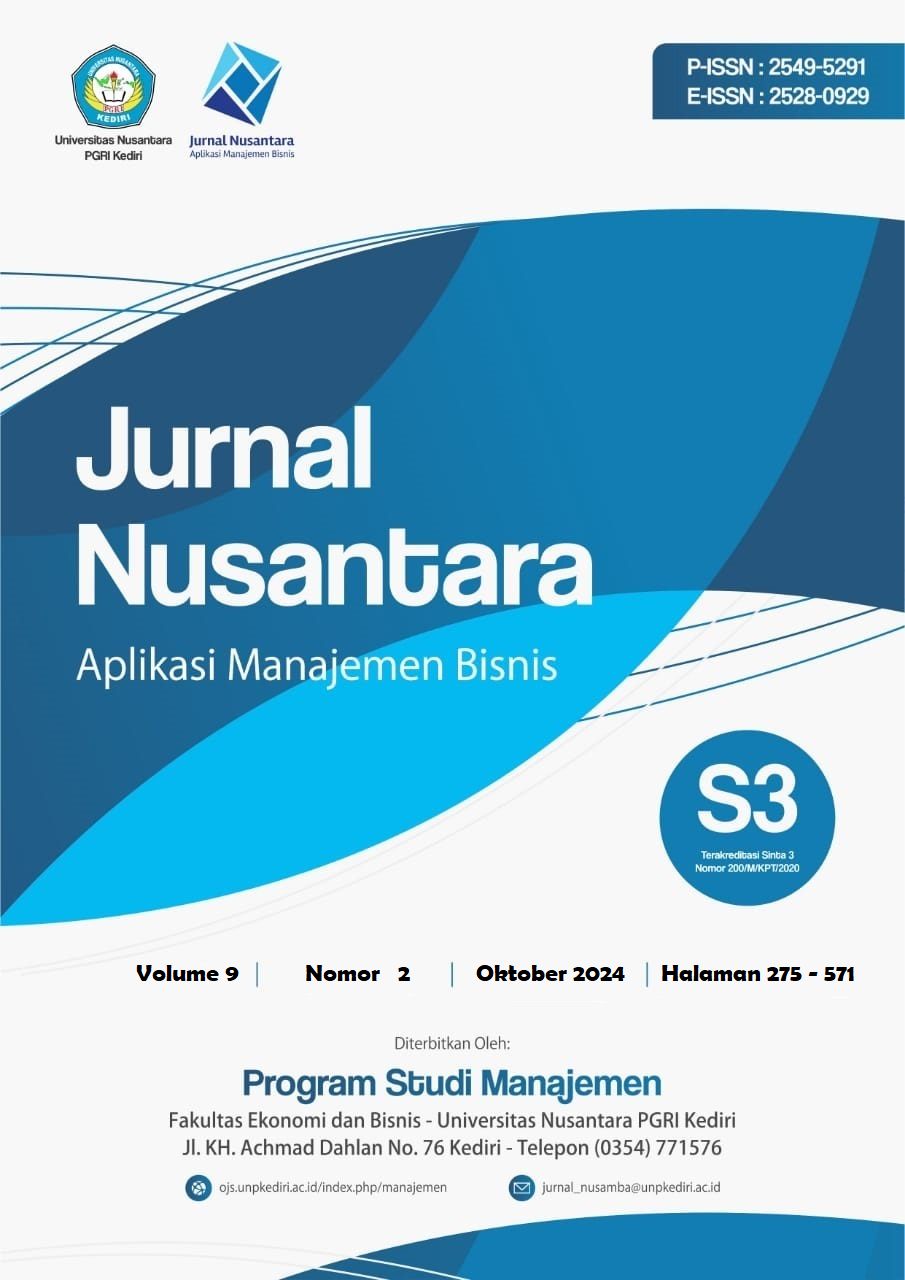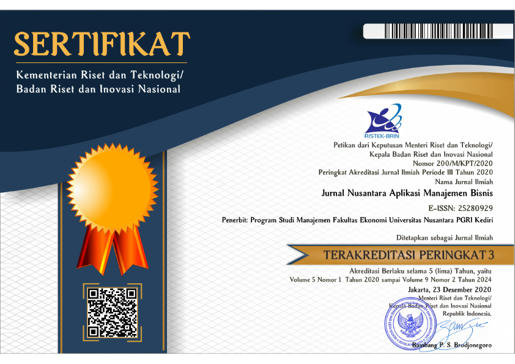Penilaian Business Sustainability Menggunakan Model European Foundation for Quality Management pada Tenant Wirausaha Merdeka
DOI:
https://doi.org/10.29407/nusamba.v9i2.21002Keywords:
European Foundation for Quality Management, Business Sustainability, Structural Equation Modeling, Self-Assessment EFQM, Wirausaha MerdekaAbstract
Research aim: Analyzing the impact of the EFQM 2020 model on assessing business sustainability and business orientation categories of Wirausaha Merdeka tenants using Structural Equation Modeling and EFQM self-assessment.
Method: The research uses quantitative data, the SEM (Structural Equation Modeling) method, and EFQM self-assessment.
Research Finding: The results of the SEM analysis reveal that organizational culture and leadership, driving performance and transformation, and strategic and operational performance positively influence business sustainability. On the other hand, purpose, vision, and strategy, creating sustainable value, and stakeholder perceptions negatively influence business sustainability. Additionally, engaging stakeholders does not influence business sustainability. Meanwhile, based on the EFQM self-assessment results, it is found that 5 tenants are product-oriented, 16 tenants are process-oriented, and 2 tenants are system-oriented.
Theoretical contribution/Originality: This research extends the application of EFQM to more specifically measure the sustainability level of vocational tenant startups, mainly focusing on the specific dimensions of business sustainability.
Practitioner/Policy implication: This study adopts the EFQM Model to assess the sustainability of vocational tenant businesses. This study will thoroughly analyze the scores obtained for each EFQM criterion and identify the critical factors contributing to business sustainability. The results of this evaluation will serve as a basis for formulating more targeted recommendations for improvement and development.
Research limitation: The EFQM self-assessment focused solely on obtaining the business orientation category through questionnaire responses, lacking in-depth evaluation through interviews.
Downloads
References
Fonseca L, Amaral A, Oliveira J. Quality 4.0: The EFQM 2020 Model and Industry 4.0 Relationships and Implications. Sustainability (Switzerland) 2021;13. https://doi.org/10.3390/su13063107.
Gonzalez G. What Factors Are Causal to Survival of a Startup? 2017;1.
Kafetzopoulos D, Gotzamani K. Investigating the Role of EFQM Enablers in Innovation Performance. TQM Journal 2019;31:239–56. https://doi.org/10.1108/TQM-09-2018-0124.
Sütőová A, Teplická K, Straka M. Application of the EFQM Model in the Education Institution for Driving Improvement of Processes towards Sustainability. Sustainability (Switzerland) 2022;14. https://doi.org/10.3390/su14137711.
Syarief IS. Program Wirausaha Merdeka Lahirkan Ratusan Kelompok dan Ide Bisnis. Suara Surabaya 2022.
EFQM 2021. EFQM Model Revised 2nd Edition Now includes Additional Information on Use Cases, RADAR Guidelines and Scoring Profiles. 2021.
Asbari M, Santoso PB, Purwanto A. Pengaruh Kepemimpinan dan Budaya Organisasi Terhadap Perilaku Kerja Inovatif Pada Industri 4.0. Jurnal Ilmiah Manajemen 2019;8.
Tjedahwati T, Syarief R, Hardjomidjojo H. Strategi Pemasaran Cv Diana Phon Bogor dengan Pendekatan Stakeholder Engagement Strategy. Jurnal Teknologi Industri Pertanian 2018;28:191–8. https://doi.org/10.24961/j.tek.ind.pert.2018.28.2.191.
Soto-Acosta P, Cismaru DM, Vătămănescu EM, Ciochină RS. Sustainable Entrepreneurship in SMEs: A Business Performance Perspective. Sustainability (Switzerland) 2016;8. https://doi.org/10.3390/su8040342.
Kafetzopoulos D, Gotzamani K, Skalkos D. The Relationship Between EFQM Enablers and Business Performance: The Mediating Role of Innovation. Journal of Manufacturing Technology Management 2019;30:684–706. https://doi.org/10.1108/JMTM-06-2018-0166.
Rahman F, Puspita Sari D, Teknik Permesinan Kapal J, Taknik Bangunan Kapal J, Perkapalan Negeri Surabaya P. Penerapan Discriminant Analysis Untuk Mengetahui Faktor Yang Mempengaruhi Tingkat Kepuasan Pengguna Jasa Unit Layanan PPNS. 2018.
de Menezes LM, Escrig-Tena AB, Bou-Llusar JC. Sustainability and Quality Management: has EFQM fostered a Sustainability Orientation that delivers to stakeholders? International Journal of Operations and Production Management 2021;42:155–84. https://doi.org/10.1108/IJOPM-10-2021-0634.
Manresa A, Escobar Rivera D. Excellence in Sustainable Management in a Changing Environment. Sustainability (Switzerland) 2021;13:1–27. https://doi.org/10.3390/su13042296.
Octavia AN, Pradiptya A, Kusumawati CA, Amalia NR. Pelatihan Penetapan Visi Misi danan Pembuatan Laporan Keuangan Umkm Asmarandhana di Semarang. Jurnal Pengabdian Kepada Masyarakat 2023;5.
Downloads
Published
Issue
Section
License
Authors who publish with this journal agree to the following terms:
- Copyright on any article is retained by the author(s).
- The author grants the journal, the right of first publication with the work simultaneously licensed under a Creative Commons Attribution License that allows others to share the work with an acknowledgment of the work’s authorship and initial publication in this journal.
- Authors are able to enter into separate, additional contractual arrangements for the non-exclusive distribution of the journal’s published version of the work (e.g., post it to an institutional repository or publish it in a book), with an acknowledgment of its initial publication in this journal.
- Authors are permitted and encouraged to post their work online (e.g., in institutional repositories or on their website) prior to and during the submission process, as it can lead to productive exchanges, as well as earlier and greater citation of published work.
- The article and any associated published material is distributed under the Creative Commons Attribution-ShareAlike 4.0 International License












